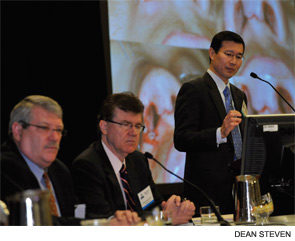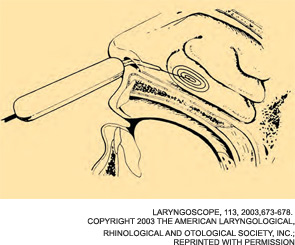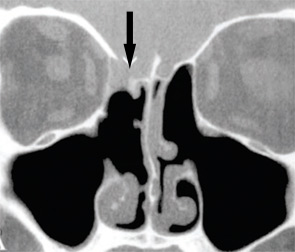Problems with the nasal valve that lead to difficulty with breathing can be tricky, in terms of both diagnosis and treatment, said a group of experts here at the Triological Society’s Combined Sections Meeting on Jan. 28.


Problems with the nasal valve that lead to difficulty with breathing can be tricky, in terms of both diagnosis and treatment, said a group of experts here at the Triological Society’s Combined Sections Meeting on Jan. 28.
Is there a simple approach to facilitating fiberoptic intubation in the difficult airway? Background: Although fiberoptic intubation is one of the more successful and frequently utilized methods to access the difficult […]

When patients with allergic rhinitis don’t respond to medical therapy, an otolaryngologist’s arsenal of treatment includes surgical options. Among these is radiofrequency (RF) turbinate reduction, also known as RF turbinate ablation or turbinoplasty, an office procedure that advocates say is cost-effective and minimally invasive, with fewer complications than other surgical remedies. Some otolaryngologists, however, are still hesitant to use this relatively new therapy.

Once the province of neurosurgeons, cerebrospinal fluid (CSF) leak repair is now handled mostly by otolaryngologists. This change has occurred over the past couple of decades, during which time the evolution of endoscopic tools and techniques has made possible extracranial rather than intracranial repair. The success rate for repairing these leaks from below has reached about 90 percent, particularly for small leaks.
Allergic rhinitis among the elderly poses a particularly difficult diagnostic challenge for the otolaryngologist. As people age, they undergo immunosenescence. The thymus, which produces T cells against new invaders, atrophies markedly after adolescence, and this decline results in a less robust immune response to bacteria, viruses and presumably allergens (J Pathol. 2007;211(2):144-156). Consequently, physicians have assumed that allergies should decline as people age.
Arecent study in Archives of Otolaryngology-Head and Neck Surgery on the potential side effects of nasal zinc therapies is the newest staging ground in the debate over how otolaryngologists can advise patients on the benefits of homeopathic treatments in the context of the common cold.
Is the balloon a useful tool for revision frontal sinusotomy to efficiently and safely allow subsequent instrumentation of the frontal outflow tract using larger, more aggressive instruments? Background: Reports of drill-out […]
Is an intranasal corticosteroid (INCS) effective monotherapy for treatment of acute rhinosinusitis? Background: Acute rhinosinusitis is often treated with antibiotics as if it were a bacterial infection; however, estimates suggest that […]
Is polydioxanone foil an effective material for stabilizing septal segments in nasal septal reconstruction? Background: Post surgical nasal septal integrity must be restored if a functionally and aesthetically healthy nose is […]
What is the impact of steroid-impregnated absorbable nasal dressing on wound healing and surgical outcomes after endoscopic sinus surgery (ESS)? Background: Wound healing has been a significant determinant of successful outcomes […]